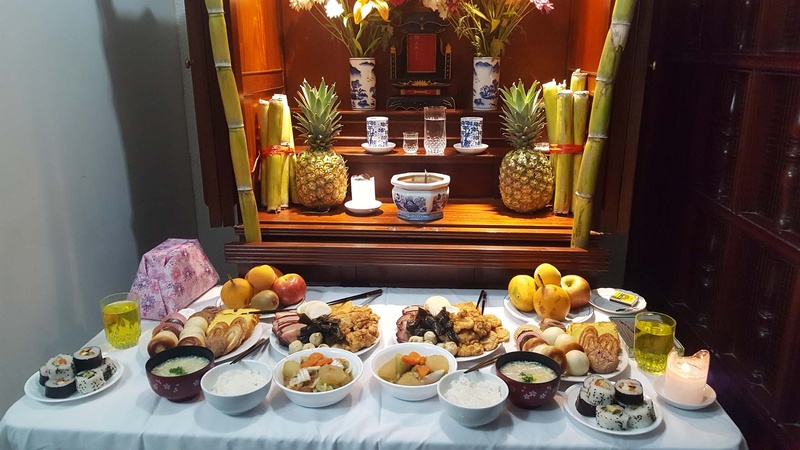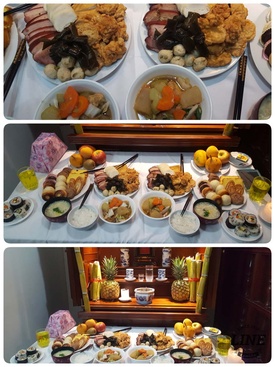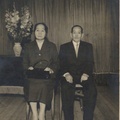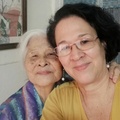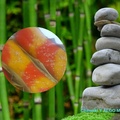TANABATA
My memories as a child are of Tanabata Day. Very early, we were preparing with my father and mother to go to the “El Angel” cemetery in Lima and also to the “Presbítero Maestro” cemetery. We brought everything to clean the graves and if any repairs were needed, we could do it that day. My mother told me: “the truth is that at home we didn't have butsudan at that time, but we always went to visit all of our deceased.” Ours was a kind of tour, we visited all the relatives and acquaintances, I remember that I ended up very tired, because all the graves we visited were not nearby. The problem was also that there were so many tombs that sometimes we lost time looking for where they were or because we couldn't find them. In those cemeteries the growth was chaotic, you went after time and a new construction was found.
Due to a family conflict, my father could not visit the butsudan of my paternal grandparents, perhaps that is why the “ butsudan ” thing was very important to me. Considering it an injustice to my father, I have always been worried about taking him, because perhaps I noticed that my father suffered in silence, since he was never able to visit his parents' “ butsudan ”. He died with that, with his actions he always told me how important it was to visit the deceased, because he was very quiet.
What caught my attention the most was that there was pure “jalado” (Asian) that day. My mom would see someone and she would bow her head in greeting. I asked her: “Mom, do you know him?.....no... he told me, like that with several people.....but if you don't know them why do you greet them. She said: it's out of respect, they are Niseis (at that time the word “Nikkei” was not used). I saw that they greeted each other respectfully. Many years later, now that I wear my dad and mom's “ butsudan ,” we go to the cemetery. Now to the “Campo Fe” cemetery in Huachipa and I see that that day (also the previous days), there are many “jalados” in the cemetery. But this time, with disappointment I see that no one greets each other anymore, many times they even avoid looking at each other, unless they really are known and stop to talk, what has happened, is it that we are losing that feeling of familiarity with all the people? “nikkei”?
The times, modernity, and insecurity have made many buy tombs in other cemeteries, abandoning the old cemeteries and making the transfers so that all the deceased in the family are together, even in “Campo Fe” there is a place only for the Nikkei .
UNKE AND UKUY
This year, in Obon, we received my father and mother; Last year we couldn't do it. It is a festival in which all our deceased are received with joy, it is a party, we are happy because they come. In our case, my mother had died and we were still in mourning, so we were not there to celebrate and, rather, that would be a lack of respect for her. We have the custom of inviting those who are there and also those who are not there (other family members) to the butsudan and to the cemetery. If they wish to come visit, they will be well received. If my dad and mom want to invite a few more people, they can do so. We do this because many no longer celebrate it, they are losing this custom, and I imagine they feel sad not to receive them in their homes, that is why we invite them.
On those days a little commotion is created at home, everything is scheduled from going to the cemetery, making the necessary purchases, orders for the sugar cane that is going to be prepared and put in the chawaki, the sweets. Among all these preparations, my son asks: what are they going to eat? When? Are you going to roll the pineapple? Question after question, he is 14 years old. He asks out of curiosity and also because at that age they are always hungry, he says that there will be a lot of “ joy ”. Faced with so many questions, I tell him: but if we ask so many questions every year, he remains silent, perhaps a little resentful; Like many things, we do them without thinking and we practically take away his curiosity. I reflect and tell myself: since I want him to continue carrying the butsudan , if I don't explain all the things to him and I don't make him part of this whole festivity, I am committing the same thing. mistake that my parents did, doing things without explaining and without taking their children into account.
I remember that a few years ago my mother's doctor, also a Nikkei, came for his medical visit at home, just on one of these obon days. He told me that, because of his job, he often could not assume the task of head of the family before the butsudan , so he had prepared his teenage son and he had to assume the responsibility in his replacement, because many times he was called to emergencies. I was surprised that, despite being a man of science, he was also convinced that this Okinawan custom should be followed.
They are at home for three days, we serve all three days: breakfast, lunch and dinner. On the first day "unke", the welcome, I tell them that we are happy to receive them, we put the two pine cones, two large cane sticks that represent walking sticks, two packages with five pieces of sugar cane, as an offering, fruits in an odd number on two dishes. On the second day, at dinner, we offer two dishes of “ yushime ”, the third day is the farewell day and the most important. The “ chawaki ” is put on, the sweets; On that day we try to offer you the best. This year leaves me with a feeling of satisfaction because my son was a little more interested, he participated by asking more questions, rolling the pineapple, he was even helping my wife prepare things, I think especially eating and that's why he liked it more. Some relatives visited us and also brought things for the butsudan , my daughter shyly also brought some sweets for her “oyi” and “oba”, what more could I ask for?
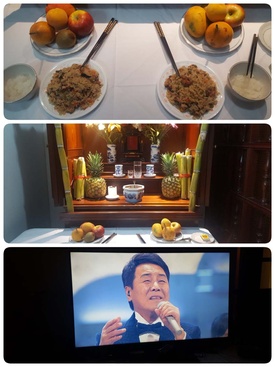
I don't know if it's religion, I don't know if it's Okinawan custom, I'm not a theologian nor do I want to philosophize, nor do I want to fight with anyone, nor do I want to discuss whether it is right or wrong. At 53 years old, I just want to follow my heart. For me the “obon” is a party, where we receive the relatives who left us, in this case my father and my mother. It's like asking " kamisama " to give us a license and be able to have my parents at home, give them what they liked and that perhaps in recent times we couldn't give them. When they both died, they had various illnesses, so some foods were prohibited, such as the traditional pork made with “shimiti” (soy sauce, seasoning and sugar) or a “cylinder pork” that my mother liked so much, but that I couldn't eat. The drink “Inka Kola”, which my dad liked so much and couldn't drink due to diabetes. Almost all things are prepared at home: “ tempura ”, “ konbu ”, “fried tofu” and some things that were bought, because it is too much work. But, in this adventure, my wife always accompanies me, without ever complaining, always accompanying me in everything, because in life she gave everything to my mother, as if she were her daughter and no one can deny that, because she believes, just like I do. , what our hearts dictate to us.
© 2017 Roberto Oshiro Teruya


